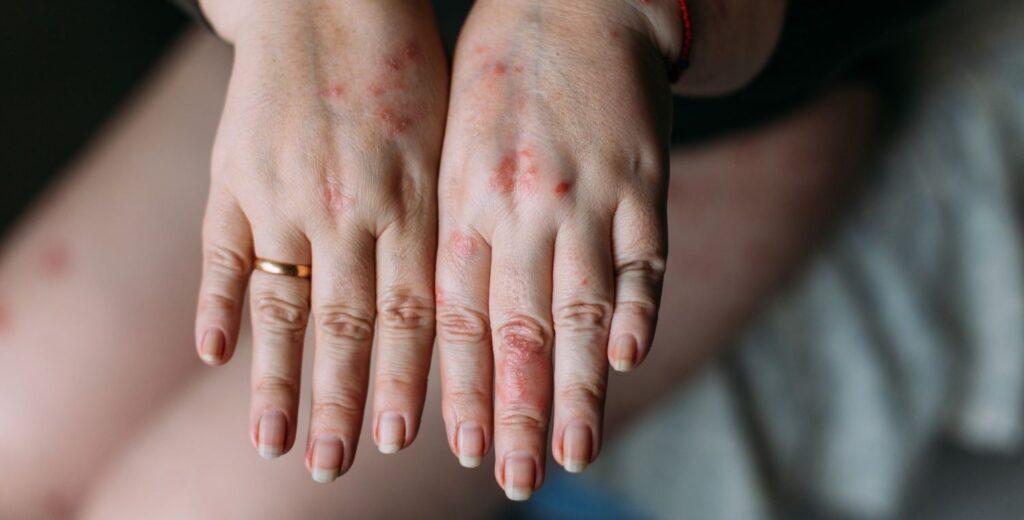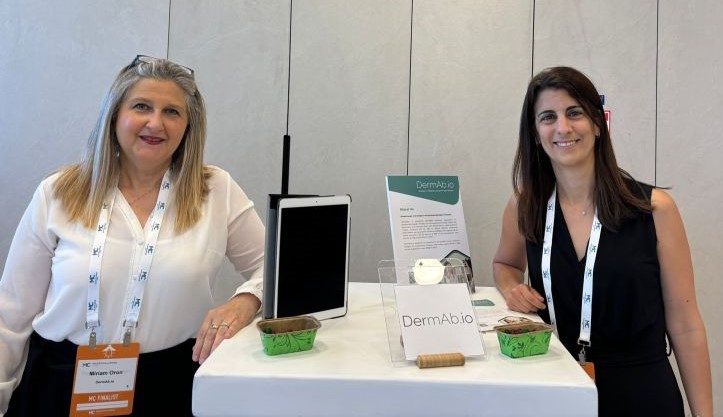Imagine a precision treatment tailored for you, based purely on individual biomarkers gathered in a simple, non-invasive swab of your skin.
Israeli startup Dermab.io is working on just that, aiming to create personalized biologic therapies (made, extracted or synthesized from biological sources) for people suffering from chronic and autoimmune diseases.
The skin is not just a mechanical barrier, Dermab.io CTO and co-founder Meital Portugal tells NoCamels.
There is in fact a “very strong connection” between the skin, the immune system and even other organs and tissue such as the gut, the brain and the central nervous system, she explains.
“This is why skin biomarkers are [used for] disease management,” she says.

As such, Portugal says, there are many diseases that can be observed by examining the skin, whether they are symptoms that are visible or not. And when they are not visible, a test of the skin biomarkers can reveal information about them.
“Almost every internal pathology involves a skin manifestation,” Portugal says. “So if we collect the skin biomarkers, we can see some alteration in the levels or concentration that might indicate the disease.”
Portugal says these biomarkers are a tool that can help model the severity of a disease or even predict it, and help manage any biologic treatment for it.
For now, the company is focusing on autoimmune diseases, using their patented AI platform to help develop better treatments.
The research is currently focused on psoriasis, which presents as a skin disorder in the form of patches of dry, scaly skin of varying sizes, but is actually an autoimmune disease – making it the ideal candidate.
The study is being completed at three Israeli centers for psoriasis – Hadassah University Hospital in Jerusalem; Sourasky Medical Center (Ichilov) in Tel Aviv; and Emek Medical Center in Afula. The company is also conducting a study on children suffering from atopic dermatitis at the Schneider Children’s Medical Center in Petah Tikva.
The main study has yielded very interesting preliminary results, Portugal says, showing that there are indeed several molecules detected in the skin through the non-invasive swabbing that can correlate to the efficacy of a biologic treatment for the disease.
The AI-powered platform is currently 80 percent accurate in predicting how a patient will respond to a certain therapy, she explains, “which is great in the scientific aspect,” but that must rise to over 90 percent in order to be of real impact for the patient – and commercially viable.
However, she adds, integrating the biomarker results with other clinical data – such as age, comorbidities and previous treatment outcomes – can push that positive predictive value to where it needs to be.

And this is just the start of what the technology can potentially do, says Miriam Oron, Dermab.io’s CEO and co-founder. Like Portugal, Oron is experienced in the field of skin biomarkers.
Sign up for our free weekly newsletter
Subscribe“We’re only scratching the surface, and there’s much more work to be done in the future,” Oron tells NoCamels, explaining that the technology can be expanded into other crucial areas of medicine.
“I believe we’ll be able to assist development of new drugs and also save time and cost of clinical studies,” she says, “because we’ll be able to screen in advance some of the molecules.”
In fact, Oron says, it is with this in mind that the company is currently in discussion with a number of pharmaceutical companies who have expressed an interest in using the Dermab.io technology for their drug development processes.
According to Oron, Dermab.io has one major competitor – a California-based company that uses microneedles to extract biomarkers from the skin, which is already commercial. But, she says, unlike the American company, the Israeli startup can be cost effective and make its platform accessible to all patients.
Founded in 2022, the Haifa-based company is a portfolio company of the MindUP incubator for early-stage digital health startups. The incubator is also located in the northern city, and works in partnership with several industry heavyweights, including US tech firm IBM, which has a strong R&D presence in Israel, and Pitango, the largest VC fund in the country.
Oron says Dermab.io’s support comes partially from the incubator and partially from the Israel Innovation Authority, the branch of the government dedicated to advancing the nation’s famed high-tech industry.

The startup was also part of the 2024 cohort for MassChallenge Israel’s Early Stage Accelerator Program, a four-month intensive course in Jerusalem that helps entrepreneurs advance their nascent companies.
Furthermore, she says, the company enjoys support from a wide network of European colleagues, thanks to the projects both she and Portugal have previously worked on that were funded by the European Commission.
They also have a team of advisors in the US, and plan to seek approval from the Food and Drug Administration for their platform. In fact, the company is planning to begin clinical trials in the US in late 2025, with the aim of becoming commercial the following year.
Both Oron and Portugal are also applying their research experience to a project called Femmune, which aims to increase understanding of how autoimmune diseases affect women.
“We noticed that there are differences in the skin biomarkers between the two groups,” Portugal says, explaining that hormonal variations between the two sexes play a major role in how the diseases progress.
But while these kinds of diseases primarily occur in females, Portugal explains, most of the clinical trials for treatments have been based on males – both in animal and human studies.
“It is very obvious, but only when you are exposed to it,” she says.
Related posts

Israeli Medical Technologies That Could Change The World

Harnessing Our Own Bodies For Side Effect-Free Weight Loss

Missing Protein Could Unlock Treatment For Aggressive Lung Cancer




Facebook comments